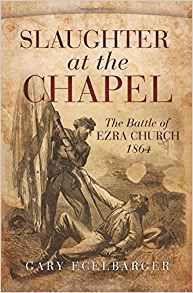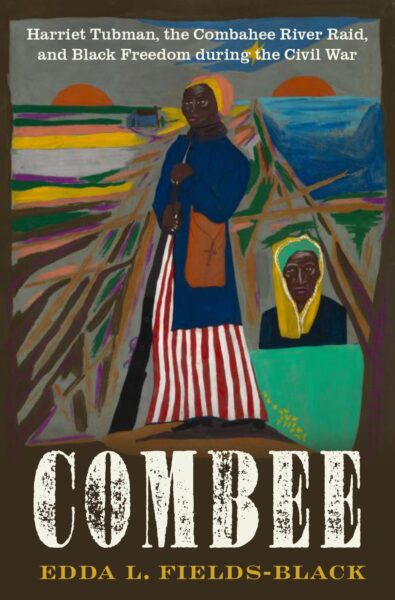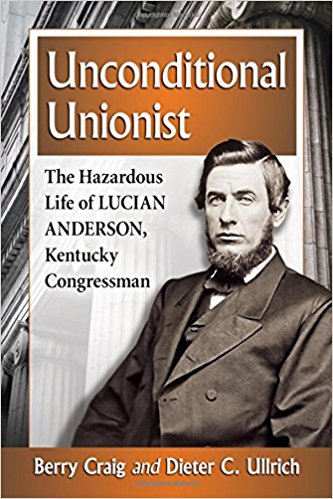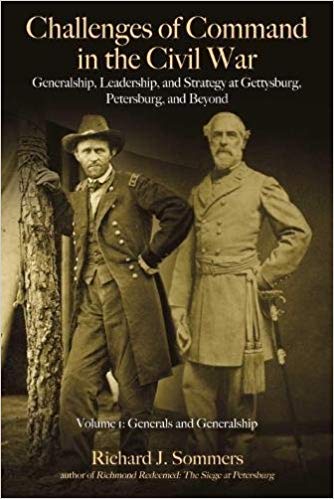Emancipation, the Union Army, and the Reelection of Abraham Lincoln by Jonathan W. White. Louisiana State University Press, 2014. Cloth, IBSN: 978-0807154571. $39.95.
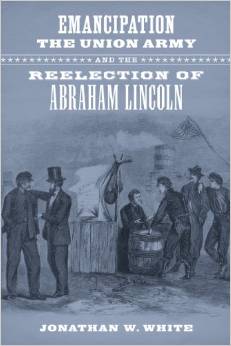 Jonathan W. White has a healthy propensity for looking where others don’t, and questioning received wisdom when others don’t, and this new book on the 1864 reelection of Abraham Lincoln shares both qualities equally. The received wisdom on the subject is that, despite some serious tremors of doubt in the summer of 1864, the victories won at Atlanta, Mobile Bay, and Cedar Creek restored Lincoln’s prestige with the voters to the point where the November presidential election resulted in a whopping victory that made “Long Abraham Lincoln a Little Longer.” One major component of this landslide was the soldier vote: 78% of the soldiers went for Lincoln rather than George McClellan, the ex-general whom the soldiers were supposed to have adored. This figure has been taken as a marker for how Lincoln’s reelection was not only a product of a rejuvenated home-front morale, but of a soldier-electorate which had at last come to embrace fully Lincoln’s emancipation policy.
Jonathan W. White has a healthy propensity for looking where others don’t, and questioning received wisdom when others don’t, and this new book on the 1864 reelection of Abraham Lincoln shares both qualities equally. The received wisdom on the subject is that, despite some serious tremors of doubt in the summer of 1864, the victories won at Atlanta, Mobile Bay, and Cedar Creek restored Lincoln’s prestige with the voters to the point where the November presidential election resulted in a whopping victory that made “Long Abraham Lincoln a Little Longer.” One major component of this landslide was the soldier vote: 78% of the soldiers went for Lincoln rather than George McClellan, the ex-general whom the soldiers were supposed to have adored. This figure has been taken as a marker for how Lincoln’s reelection was not only a product of a rejuvenated home-front morale, but of a soldier-electorate which had at last come to embrace fully Lincoln’s emancipation policy.
This, at least, has been the view offered by James M. McPherson (especially in For Cause and Comrades: Why Men Fought in the Civil War) and by his distinguished students, Chandra Manning (in What This Cruel War Was Over: Soldiers, Slavery, and the Civil War) and Jennifer Weber (in Copperheads: The Rise and Fall of Lincoln’s Opponents in the North). It is a view which has the virtue of assuring us that the soldiers who fought to save the Union increasingly, over the course of the war, were persuaded to become moral crusaders who were fighting for abolition, and thus on the side of the angels.
This is, White wonders, perhaps too convenient. Gary W. Gallagher, in The Union War (2011), poked a stick into a hornet’s nest by suggesting that Union soldiers did fight primarily for the restoration of the Union rather than emancipation, and that fighting to restore the Union was not an ignoble (much less un-angelic) thing to do. And in the same spirit, White notices that in the 1864 election, the results of the soldier vote were skewed by the fact that 20% of the soldiers did not vote at all; of those who did, 22% voted for McClellan (the actual percentage of soldiers eligible to cast votes who did so for Lincoln was only 56.7%). Even among the 78% of soldier-voters who went for Lincoln, White presents substantial evidence that these votes were more anti-Copperhead than pro-emancipation. “These election results do not reveal a conversion of the soldiers to Republicanism,” he writes, “but rather a rejection of Copperheadism.” And he does not discount the pressure exerted on soldier voters by the War Department to vote Lincoln. Democratic newspapers were banned from army camps, Democratic candidates barred from canvassing, Democratic ballot papers destroyed, antiwar letter-writers back home got themselves arrested, and officers who mouthed “disloyalty” found themselves court-martialed.
This has several serious implications for any discussion of the role of emancipation in the minds of the northern public and its army. The self emancipation thesis, as popularized by Vincent Harding, Barbara Fields, and Ira Berlin, insists that fugitive slaves not only emancipated themselves by flight, but emancipated others by evangelizing the Union forces they fled to with the gospel of abolition. White doubts whether anything quite so dramatic occurred; to the contrary, resistance to emancipation triggered an entirely different sort of fugitive: namely the Union army deserter and his legal counterpart, the soldier who declined to re-enlist. Of the 922,000 Union soldiers whose enlistments expired in 1864, only 15% chose to sign again and fight on.
This leads White to the larger question of soldier voting itself. Some soldiers had been able to take advantage of absentee voting provisions even during the Revolution, but, by-and-large, soldier voting was not a common practice. At the beginning of the war, only Pennsylvania authorized its volunteers to vote at-a-distance, and even that was overturned in May 1862 in Chase v. Miller, in which Democratic Pennsylvania Chief Justice George Woodward ruled that soldier voting violated the residence requirements of the state constitution. The political agenda in this decision spurred Republican legislatures in the Midwest to begin enfranchising their own state volunteers, and by 1864, nineteen northern states had passed legislation permitting their state volunteers to cast ballots. Ironically, once the war was over, state legislatures promptly began revoking their soldier enfranchisement laws. These laws were re-adopted during World War I, but the logistical difficulties of recording and submitting ballots from around the world held the soldier vote to the tiniest of fractions (less than one half of a percent in World War II). Even today, White notes, uniformed personnel remain the single largest group of disfranchised Americans.
Although Reconstruction falls beyond the purview of White’s study, his reinterpretation of the 1864 soldier vote has something important to say there, as well. It has long been a puzzle how an army dedicated to emancipation could acquiesce so easily in both the disenfranchisement of the freedpeople and the recovery by the Confederate elite of political control in the South. The answer may well lie in understanding that Lincoln’s Republicans never commanded a permanent majority of the northern white population, and that once the war was over, soldiers resumed their prewar civilian political identities. This is not the same thing as saying that Union veterans bought “reconciliation” at the expense of “emancipation” in the postwar years. But it does imply, sadly, that emancipation may never have been all that enthusiastically embraced.
Allen C. Guelzo is the Henry R. Luce Professor of Civil War Era Studies at Gettysburg College and the Lincoln Prize winning author of Lincoln’s Emancipation Proclamation: The End of Slavery in America (2004).

